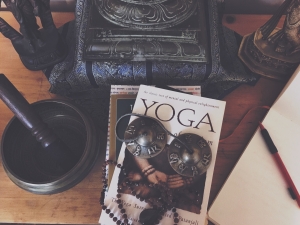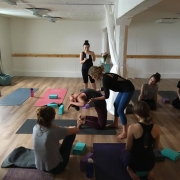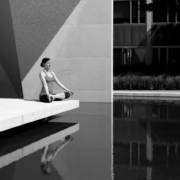How To Study Well: 9 Things To Consider
 As a yoga teacher trainer I am often asked to be a guest teacher for training programs around BC and to present on the topics of yoga history and philosophy. I believe I get these invitations because I have always taken my own studies of these topics seriously and have invested a lot of time into them. I have been a passionate student of yoga since the late 90’s and in this time I have learned a lot. I have also been confronted with how much there is to know, and I have accepted the truth that I will likely never know it all- not in regards to these topics I love, or any topic for that matter. So knowing it all is not the goal, as that is impossible, however continually deepening my understanding is. If you are a passionate student then likely this is your goal too, so in service of
As a yoga teacher trainer I am often asked to be a guest teacher for training programs around BC and to present on the topics of yoga history and philosophy. I believe I get these invitations because I have always taken my own studies of these topics seriously and have invested a lot of time into them. I have been a passionate student of yoga since the late 90’s and in this time I have learned a lot. I have also been confronted with how much there is to know, and I have accepted the truth that I will likely never know it all- not in regards to these topics I love, or any topic for that matter. So knowing it all is not the goal, as that is impossible, however continually deepening my understanding is. If you are a passionate student then likely this is your goal too, so in service of
I have also been confronted with how much there is to know. and I have accepted the truth that I will likely never know it all- not in regards to these topics I love, or any topic for that matter. So knowing it all is not the goal, as that is impossible, however continually deepening my understanding is. If you are a passionate student then likely this is your goal too, so in service of
And I have accepted the truth that I will likely never know it all- not in regards to these topics I love, or any topic for that matter. So knowing it all is not the goal, as that is impossible, however continually deepening my understanding is. If you are a passionate student like myself then likely this is your goal too, so in service of that I wanted to share nine things I have come to understand as supportive to the learning process, no matter where your interest lies.
Dig A Deep Well: the first thing I know to be true is that when we find an area of study that fascinates us we must be willing to dig a deep well and pursue that topic with focus. This might mean putting aside other studies for a while, working with a single teacher or school, or learning a specific method inside out and sideways. To know something we must establish a relationship with it and be willing to put in some serious time. There is no shortcut in regards to this step, and no fast track. All of my teachers have stressed this point, and I know it to be true based on my personal experience, I have also learned that the rewards of digging deep will be an understanding that goes beyond the surface and will enrich your life in ways you cannot know until you commit yourself.
Study Widely: while it is important to dig a deep well it is equally important to approach your studies from various angles. If I use my own study of Yoga philosophy as an example this has meant learning from both scholars and practitioners, it has meant learning how to search out academic sources as well as listening to the perspective of those who may interpret the material in new ways, or for an audience of householders. The only caveat to this is when studying widely we must do so with an understanding of context (see Tip #4).
Consult Experts: this can be a tricky one in this day of self proclaimed experts readily available with their opinions, but I think it is very important to search out teachers who have made your area of interest a specialty. Learn from those who have dug a deep well themselves, whether they be academics or practitioners, and your own knowledge and understanding will be enhanced. Be willing to do a bit of a detective work and search these teachers out, as they may not always have a public face or teach to the mainstream.
Understand Context: this point is so very important, and will help us to learn all that we can from various sources, while avoiding getting caught up in dogma and rigid opinions that can block further learning. All teachers, schools, lineages, and texts come with a certain built-in bias, and it is extremely valuable to know what that is as we embark on our studies. In an ideal world, that bias or perspective would be explicitly stated, but that is not always the case. This is why I urge my Yoga Philosophy students to consider multiple translations of a specific text, and to identify the translator’s bias before they begin reading the work. I have learned a lot from teachers and schools that have a very specific perspective on practice or methodology, but in order for my knowledge to be well rounded, I needed to also understand the context of other methods. So you can see that Study Widely and Understand Context go hand in hand in supporting a high level of studentship.
Listen Intently: listening is of course key to learning. We practice listening by putting in our time reading as much as we can on our chosen topic, studying with knowledgeable teachers, hearing the reflections & questions of other students on the path, and of course by paying attention to our own questions and insights as they arise. Listening intently can also be supported by a willingness to sit with our questions for a while as we familiarize ourselves with a topic- and this is hard to do. I know. But as one of my own teachers once told me, the value of a good question is worth ten times more than a straight answer, and often a “good question” is the one we can’t yet articulate but must sit with as it will strengthen our curiosity and lead us deeper into our studies.
Ask Questions: while there is value in holding our questions close at times, it is also equally important to reach out and ask questions. As a teacher, I have seen the way in which a student’s shyness or pride can get in the way of their learning when they are not willing to put themselves out there and ask a question. It seems there is a lot of shame in our society around not knowing, or not understanding something, and not enough value placed on the importance of being a student, or a beginner. This can cripple our studies and is worth investigating within ourselves, as we must be willing to ask questions if we want to understand something. So do take the time to formulate your questions as clearly as you can, and do allow yourself the time to receive the information you are already learning before you begin asking for more, but do ask!
Contemplate & Reflect: this step is so key to digesting and assimilating information, plus I also find it an invaluable process in refining my own questions. For myself, contemplation and reflection include journal writing and note taking, as well as internal mental reflection. This is what allows me to chew on an idea for a while in an attempt to see it from all angles, or “get it” at a deeper level. Again this is something that all of my own teachers have stressed as important, and once again there is no shortcut or fast track. Without taking the time to contemplate and reflect on what we have learned we can become great consumers of information, but never be able to apply it or articulate it.
Apply What You’ve Learned: obviously this is key with any type of study, and takes learning and contemplation into action. Whether this means practicing a specific method, or simply applying a philosophical teaching or viewpoint to your daily life, there comes a point where we must practice what we have been learning in theory. Ideally, this leads us to more questions that will, in turn, help us to refine our knowledge and allow it to become living wisdom.
Be Willing to Un-Learn, Re-Learn & Not Know All Over Again: and finally in order to keep learning, and we must keep learning as knowledge is never static, then we must be willing to un-learn what we previously knew, re-learn something at a greater level of sophistication, and place ourselves in a state of not knowing time and time again. The best teacher is always the most passionate student, and the best student is always the one with the beginner’s mind- open, curious, and engaged.
Conclusion:
I don’t know much but I do know these nine things to be true in relation to study, and while there is always much more that could be said I will leave it at that for today. I hope you have found it helpful and that your own desire for learning will take you far.













